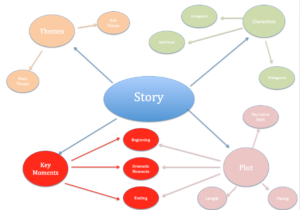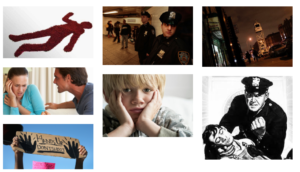
5 Fun Ways To Plan Your Novel
By Nick Tingley on 13. September 2016, in GeneralA lot of writers say that a good novel is born out of great planning. But still a lot of writers forgo this fairly crucial stage and dive straight into the text. And invariably, somewhere along the line, they get hopelessly lost.
But never fear! Here we have assembled our top 5 ways to plan your novel whilst keeping it fun at the same time.
1. Brain Storms
I remember when I first heard of a brainstorm when I was at school. I wasn’t sure about it then – to be honest I couldn’t think of a scenario when I’d ever need one. But now, I can’t plan without one.
There really is no better way to get your idea down on the page than to create an intricate web of concepts. I’m talking themes, characters, plot lines, sub plot lines, settings – you can even put individual scenes in there. In as little as half an hour you can build your book up from nothing. More to the point, you have a visual representation of how each element of your story links together.
What more could you want?
2. Mood Boards
 A similar concept to brain storms. Mood boards are basically visual representations of your story. It is used fairly extensively when planning film and television shoots. If it’s good enough for them, it’s good enough for me.
A similar concept to brain storms. Mood boards are basically visual representations of your story. It is used fairly extensively when planning film and television shoots. If it’s good enough for them, it’s good enough for me.
Some authors call it a collage, but the principle is the same. All you need to do is browse the internet for images that fit the idea you have and, when you find them, simply pop them all together to create a collage. You don’t need to spend long doing it and when you finished you will have a very rough visual representation of your story. Then, whenever you get stuck, just look up at it and let the images wash over you.
3. Music
Want you main character to have a favourite type of music or musician? Setting your story in somewhere where the music is really distinctive? Spent half an hour or so just listening to it – you can even do other things like washing up or reading if you like. Just immerse yourself in what your characters will immerse themselves in. Very soon you will feel the excitable impulse to write just flowing through you.
If you’re really hardcore, make sure that music is playing every time you write a scene with that particular character. Use it to create a musical motif. I guarantee you will never struggle to find their personality again.
4. Write A Scene
Not the first one. That one. The one that you thought of the moment you came up with the idea in the first place. It doesn’t matter if it’s in the middle or the end, just pick the scene that is most powerful. You can usually tell if you have the right one by how nervous it makes you feel and it almost always will contain two or more characters talking.
Then open up your computer and start writing the scene, almost as though you are writing a film script. Don’t worry about putting in any actions unless they are integral to the story – just write what they say to each other. Let the scene flow until it reaches it’s natural conclusion. Then stop.
You will have just written the point that your entire book will be building up to. From that point, you will know exactly what you need to do to get there and, with any luck, you’ll have a pretty good idea of how your characters speak as well.
5. Design Your Main Character
I cannot tell you how useful this trick is. You don’t have to be good at drawing, you just need to have a vague idea of how your character looks and why. I used a piece of online software called Hero Machine 3 to design one of my characters and I have never looked back. And it even inspired me to build more into my character’s profile – I mean, who would’ve thought that a scarf could make that much difference to a story…?
Create a 2D version of your character. What they are wearing, how they are dressed, how they have their hair. Everything. Then stick that picture on the wall behind your computer and, whenever you’re struggling, just give them a little look and carry on writing.
It’s the best fun you’ll have planning a book.
Ever.

TinyURL
Hello, Jack speaking. I’ve bookmarked your site and make it a habit to check in daily. The information is top-notch, and I appreciate your efforts.
HealthMassive
Your articles never fail to captivate me. Each one is a testament to your expertise and dedication to your craft. Thank you for sharing your wisdom with the world.
Smartcric
Smartcric I truly appreciate your technique of writing a blog. I added it to my bookmark site list and will
Puraburn effectiveness
Puraburn naturally like your web site however you need to take a look at the spelling on several of your posts. A number of them are rife with spelling problems and I find it very bothersome to tell the truth on the other hand I will surely come again again.
Leon165
Awesome https://shorturl.fm/oYjg5
Makenzie3131
https://shorturl.fm/N6nl1
Kimberly1093
https://shorturl.fm/bODKa
Mallory3013
https://shorturl.fm/oYjg5
Lorraine1735
https://shorturl.fm/A5ni8
Drake4296
https://shorturl.fm/YvSxU
Bernice4908
https://shorturl.fm/6539m
Marcel2895
https://shorturl.fm/oYjg5
Hugh4518
https://shorturl.fm/YvSxU
Barret237
https://shorturl.fm/N6nl1
Loren1951
https://shorturl.fm/j3kEj
Kennedy1080
https://shorturl.fm/m8ueY
Deirdre3845
https://shorturl.fm/N6nl1
Erik2325
https://shorturl.fm/A5ni8
Delia1737
https://shorturl.fm/bODKa
Melanie4635
https://shorturl.fm/9fnIC
Elaine131
https://shorturl.fm/bODKa
Victoria3253
https://shorturl.fm/TbTre
Greg1144
https://shorturl.fm/XIZGD
Michael1227
https://shorturl.fm/A5ni8
Katelyn2192
https://shorturl.fm/LdPUr
Archie3030
https://shorturl.fm/Xect5
Adeline2978
https://shorturl.fm/xlGWd
Deborah1088
https://shorturl.fm/0EtO1
Celia3137
https://shorturl.fm/Kp34g
Mario4378
https://shorturl.fm/0EtO1
Kendall1886
https://shorturl.fm/retLL
Joshua1835
https://shorturl.fm/ypgnt